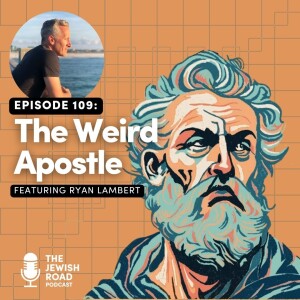
Summary
Imagine discovering that one of the most influential figures in Biblical history may have been misunderstood for centuries. That’s the compelling problem Ryan Lambert tackles in his book, The Weird Apostle. As a Messianic Jew, Lambert challenges the traditional portrayal of the Apostle Paul, urging us to see Paul not as a renegade who sought to break away from Judaism, but as a devoted Jew who remained faithful to the Torah.
In our latest episode of The Jewish Road Podcast, Lambert shares his deep passion for building bridges between Christians and Jews, shining a new light on Paul's mission and his message.
Lambert argues that by understanding Paul within his Jewish context, we can undo centuries of replacement theology that has strained Christian-Jewish relations. He points out that Paul never intended to create a new religion but sought instead to unite Jews and Gentiles under the worship of the one true God. And far from being a distant theologian, Paul was a real man writing letters to real communities, with a sense of urgency about the return of the Messiah.
Lambert’s insights invite us to reconsider Paul’s legacy and the rich, shared history between Jews and Christians, opening the door to greater unity and understanding in our faith journeys.
Takeaways
- Understanding Paul in his Jewish context can challenge the traditional narrative and improve relationships between Jews and Christians.
- Paul was a faithful Jew who upheld the Torah and did not seek to replace Judaism with Christianity.
- The Jewishness of Jesus is widely recognized, but the Jewishness of Paul is often overlooked.
- Reframing Paul's role as a bridge between Judaism and Christianity can help foster dialogue and understanding. Paul believed that the end was near and expected the Messiah's return in his lifetime.
- Paul's letters were intended for real communities and not as theological texts for future generations.
- Replacement theology has created division between Christians and Jews and goes against Paul's message.
- Paul's message was intended to join Jews and non-Jews together under the worship of the one true God.
Chapters
Comments (0)
To leave or reply to comments, please download free Podbean or
No Comments
To leave or reply to comments,
please download free Podbean App.